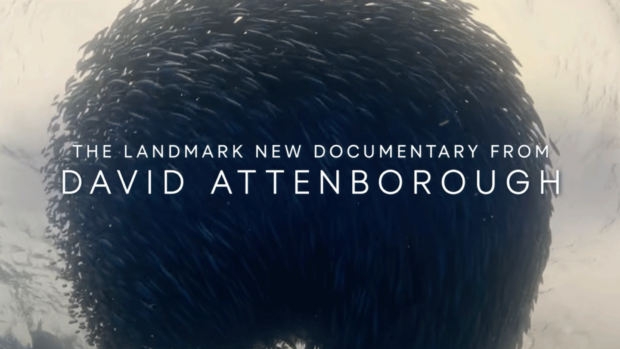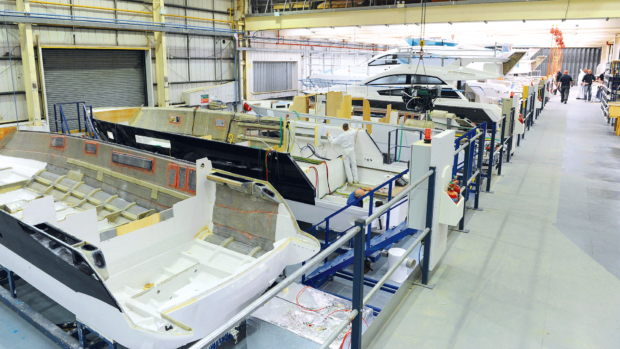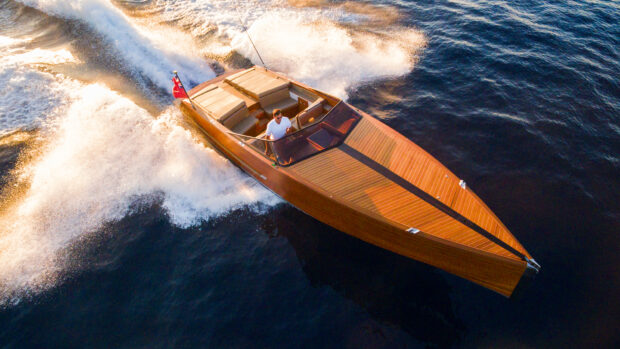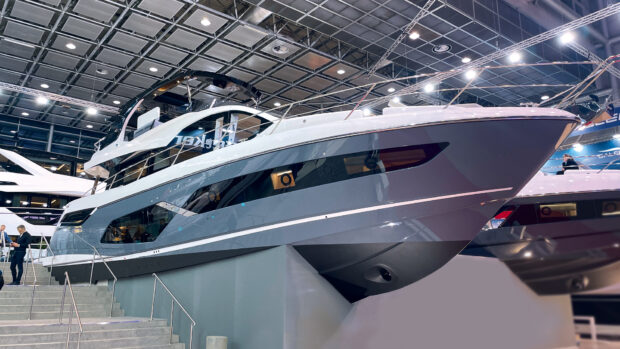Archipelago Yachts is convinced that methanol is the key to a cleaner, greener future and has designed a long-range power catamaran to prove it, reports Hugo Andreae
Stephen Weatherley is a man on a mission. As well as being the founder and CEO of Archipelago Expedition Yachts, a British-built range of aluminium motor catamarans, he’s also trying to resolve the intractable issue of how to make offshore motor yachts greener and thinks methanol might be the answer.
“There are currently five possible green fuels,” points out Weatherly, succinctly. “Hydrogen, ammonia, LNG (liquid natural gas), batteries and methanol. Ammonia and hydrogen are difficult to store on board a boat, LNG is a fossil fuel so emissions reductions are limited and batteries don’t have the range to power a true offshore vessel. That leaves methanol as the only viable fuel.”
Powered by methanol
He’s not alone in coming to that conclusion. The shipping industry is already adopting methanol as the fuel of the future. According to the Norwegian classification body, DNV, there are now 228 methanol dual fuel-powered ships on order, with methanol overtaking LNG as the green fuel of choice for container carriers.
The reason it also makes sense for leisure boats is because methanol is a liquid rather than a gas, meaning it’s easier to transport, store and distribute using existing infrastructure. And it can be burnt in conventional combustion engines, either in combination with fossil fuels like petrol and diesel, or on its own, with only minor adaptations.

Twin hull design and recycled aluminium construction make this the ideal platform for running a hybrid methanol-powered drivetrain
During the 1970s fuel crisis up to 20,000 methanol-fuelled cars were in use on US roads, while in the 1980s and 1990s small amounts of methanol were regularly blended into European petrol supplies.
Now Weatherly wants to demonstrate that it works just as well for boats, with a production-ready design for a 63ft methanol powered explorer yacht. Called the Archipelago zero.63, it is fuelled entirely by methanol (unlike ships which burn a mixture of diesel and methanol) but has two different means of consuming it.
For low-speed cruising up to 10 knots, a methanol reformer splits the liquid fuel into hydrogen and carbon dioxide. The hydrogen is then fed into a low-pressure buffer tank before passing through a fuel cell to generate electricity for the two 25kW electric motors and a relatively small 100kWh battery bank.
When more power is needed, the methanol can also be burned in a pair of specially adapted 360hp direct injection combustion engines, enabling faster cruising speeds of up to 22 knots.
Article continues below…

Electric boats: A-Z of the 37 best all-electric models

Best power catamarans: 6 of the best models on the market right now
Fast and clean
The beauty of this parallel hybrid system is that it gives all the benefits of an electric vessel, such as silent operation and fewer emissions, without the drawbacks of limited speed and range. Weatherly says the zero.63 has an expected range of around 2,500nm.
He’s also refreshingly honest about methanol’s limitations. Due to its lower energy density (roughly half that of diesel) you need to carry twice as much of it. It also has a low flash point and almost invisible flame, which means additional fire precautions are needed, plus only a small proportion of the world’s methanol production is truly green – the majority of it is refined from natural gas, known as grey methanol.
The first two have already been taken care of with the aid of an extra large 10,000-litre fuel tank slung between the hulls for maximum safety and a methanol fire suppression system triggered by heat (rather than smoke) detectors.
How green is it?
The issue of methanol’s credentials as a green fuel is more complex. It’s a much cleaner burning fuel than either diesel or petrol, with far fewer harmful emissions such as oxides of sulphur and nitrogen, not to mention the sooty particulates visible in diesel smoke. It also biodegrades quickly and safely in water and soil.
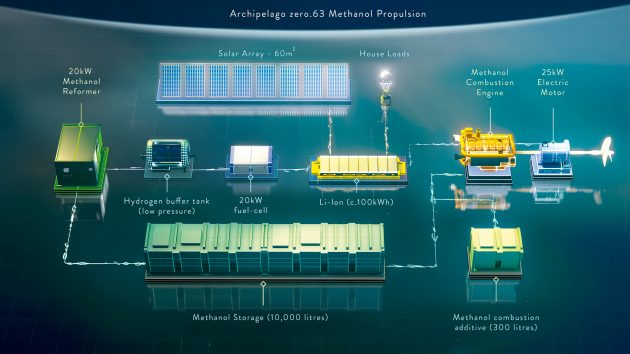
However, unlike hydrogen, which emits only water when burnt, methanol does create a certain amount of the greenhouse gas carbon dioxide. It still represents a significant saving over liquid fossil fuels (studies put the saving at around 28%) but unless the methanol has been produced using green technology it is not a true carbon neutral fuel.
The crucial difference is that unlike fossil fuels, methanol can be produced in a sustainable way, either by distilling it from biomass (much like alcohol) or by combining carbon dioxide (using carbon capture technology) with green hydrogen produced by electrolysis in wind or solar farms.
The hope is that the wider take up of methanol and the increasing demand for zero-carbon fuels spurred on by ever tighter regulations will drive the growth of green methanol production.
In the meantime, Archipelago Yachts and its partner Chartwell Marine have already completed the design phase of the zero.63 with the help of an Innovate UK Smart Grant and are now hoping to win further funding (or find a wealthy customer) to help turn their vision into reality.
The technology already exists, with suppliers sourced for all the different elements of the drivetrain, so it’s just a question of putting it all together on a new purpose built hull. Weatherly puts the cost at around £4.5 million, a considerable premium over the £2.8 million price tag of a conventional diesel-powered Archipelago 63, but a drop in the ocean when it comes to securing a greener future for the wider marine industry.
Archipelago zero.63 specification
Electric motors: 2 x 25 kW
Methanol engines: 2 x 360hp
Methanol reformers: 2 x 20kW
Hydrogen fuel cell: 2 x 20kW
Solar cells: 12kWp
Battery: 100kWh
Methanol capacity: 10,000 litres
Max speed: 22 knots
Max range: 2,500nm




